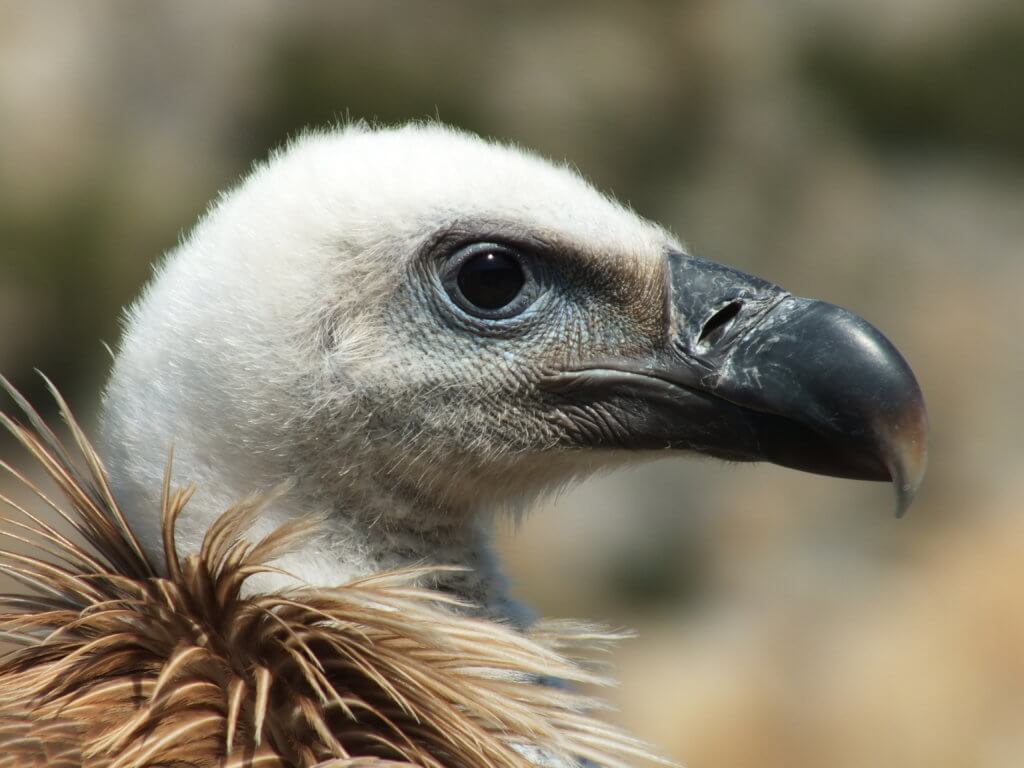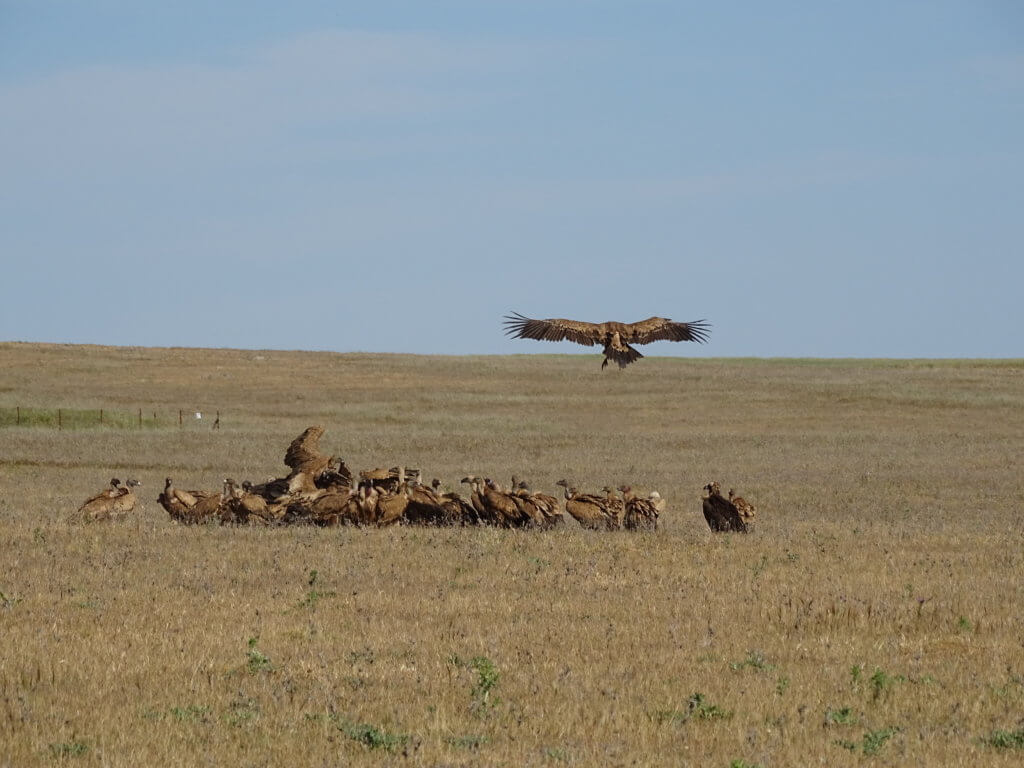
Ian Parsons spent twenty years working as a Ranger with the Forestry Commission, where he not only worked with birds of prey and dormice, but where he developed his passion for trees. Now a freelance writer, Ian runs his own specialist bird tour company leading tours to Extremadura. For more details see www.griffonholidays.com
This is Ian’s fifth Guest Blog here and you can access all the others through the Guest Blog Archive – click here.
Ian’s book, A Tree Miscellany, was reviewed here.

Vultures are truly brilliant birds, I could write this entire blog just telling you why that is, but I guess that most of you reading this already know that. I love them, especially the Griffon Vulture; I named my bird tour business after them (Griffon Holidays) and my Twitter ‘name’ (@Birder_Griffon) too. Seeing them soaring above me, flying at eye level past me or hearing that ‘whooossshhh’ as one flies close overhead, cutting through the air on those massive wings, just makes me feel good. Really good.
That’s why I am writing this. They are magnificent birds, they are vital components of many of our ecosystems and they are also in serious danger.
In the 1990s and the early part of this century, ninety nine percent of the vultures living in the Indian subcontinent were killed. Yes, 99%. They were killed by a drug used in livestock farming, a drug known as Diclofenac; an anti-inflammatory medicine that is licensed for use on us, as well as for veterinary use in the treatment of cattle. The problem is, cattle die and vultures do the job they having being doing forever; they are nature’s clean up crew, disposing of the carcass quickly and efficiently, helping to prevent the spread of diseases and saving the farmer the expense of removing it themselves. Diclofenac may be safe to use by mammals, but in the digestive system of birds it is extremely toxic and kills quickly. It is a lethal drug to have in the environment. It has been estimated that only 1% of the livestock carcasses in the Indian subcontinent had Diclofenac present in them, that 1% wiped out 99% of the Vultures.
The countries of the Indian subcontinent, India, Pakistan and Nepal have reacted to this disaster and have banned the veterinary use of Diclofenac. This has been followed by other countries such as Iran, but it hasn’t been followed by the European Union, who still license the product for veterinary use. Europe is home to the Griffon Vulture, the Black Vulture (the real one!), the Egyptian Vulture and the Bearded Vulture, all of these beautiful, impressive birds are under threat in Europe because of the EU continuing to license this product for use in the treatment of cattle. But it is not just vultures that are threatened, recent studies have shown that Steppe Eagles are just as vulnerable, which probably means that birds such as the Golden Eagle and the Spanish Imperial Eagle (both of which will scavenge on carcasses) are too.
This is just plain stupid.
A recent study has shown that if Diclofenac continues to be licensed by the EU then 6,000 Griffon Vultures could be killed by it each year, within ten years the population of this iconic bird would be reduced by 70%. It is not just stupid, it is completely irresponsible. It is also totally avoidable.
Banning the use of veterinary Diclofenac does not mean that Europe’s livestock is going to suffer. There are alternatives that do the same job, but don’t kill vultures. The use of these alternatives doesn’t mean that Europe’s farmers are going to be hit economically either, the alternatives cost roughly the same as Diclofenac and the economies of scale would suggest that if Diclofenac is banned and the sales of the alternatives goes up, then their manufacturing costs will go down.
It is a complete no brainer surely? Unfortunately, the vast majority of the politicians of the European Union (including ours – we are still members and will be for a while yet) don’t seem to be bothered by the loss of our vultures; they don’t seem to care at all. If they did, they would follow the example of the politicians of Iran, India etc and ban this deadly drug.
A group of conservation organisations have recently come together to launch a campaign to get this rectified. Birdlife Europe and Central Asia, the World Wildlife Fund for Nature (WWF), the Vulture Conservation Foundation (VCF), SPEA (the Portuguese Birdlife partner organisation) and SEO (the Spanish Birdlife partner organisation) are the organisations involved and I would urge you from the bottom of my heart to support them. They have a petition – please sign it.
I would like to point out that I don’t work or have any connections to the above organisations, I haven’t written this on their behalf. I have done it because I care, because I love vultures and the thought that we in Europe could wipe them out through sheer stupidity makes me both angry and sad. Please support the campaign to ban veterinary Diclofenac.

Well said Ian.
Signed.
Thank you so much for this Ian, I have been banging on about this for so many years but the stupidity goes on.
I would however like to point out that the situation is actually worse than Ian states.
The fact is that this foul drug was licensed by the EU AFTER they already knew of the almost total extinction of Asian vultures, I believe in 2013/14.
Against all the advice of their own scientists, against all the representations made to them by NGOs in Europe and Asia, they went ahead and licensed it anyway.
Even more stupid is that the increase in vulture numbers in Spain has been partly funded by the EU themselves. With our money.
While at the birdfair two years ago, I spoke to the many Spainish tour companies represented there. Only one person on one stand had heard of Diclofenac and even he only knew of the Asian story. He hadn’t heard that it was licensed for use in Europe and I got the distinct impression that he didn’t believe it had been.
May I also put into perspective Ian’s 99%. We are not talking here about thousands of birds as we would be in Europe. The vultures in India numbered in many millions.
Millions down to a handful in fifteen years!
Vultures are not just good to look at, they are the end of the pathogen chain. They can eat a carcase diseased with anthrax, tuberculosis and enjoy it!
The cow is sacred in India. If a cow dies it has been immediately cleared by vultures. As the vultures declined so feral dogs have increased bringing with them the inevitable spread of rabies.
Much has been written about how the EU are the saviour of our wildlife, how we will suffer after Brexit. Believe me, the EU can be just as stupid as any home grown politician.
Please sign this petition.
I’m surprised that you found few Spanish tour guides at the Bird Fair knew about Diclofenac and its impact on vulture populations. I know many of the people involved in bird tours in Andalucia and I would have said most certainly knew about both the drug and its impact on vultures (although I can’t say either way about their knowledge of its use in Europe). Some have even blogged or posted on FB on the issue which has also been reported in the Spanish media (national and specialist). Perhaps, since raptor migration across the straits, is the ‘jewel in the crown’ of Andalucian birding, they are more likely to know than those involved elsewhere.
Look here .
https://www.youtube.com/watch?v=5DO6kkOmZCQ
Signed & shared on FB & Twitter.
I don’t know when Diclofenac became commonly used but it was invented in about 1970 and it took 30 years for it’s disastrous results to be discovered.
And yet pesticides like acetamiprid (a neonicitinoid in Gazelle) which have only been on the market for a couple of years are given the government OK and have been used on nature hot spots like Mull.
https://www.facebook.com/nomoreneonicsonmull/
I watched in absolute horror 2 videos made in India on Diclofenac and the catastrophe that has ensued with its usage .
A lifelong birder , I can hardly type this , my hands shake so badly .
Literally tears in my eyes at the abject ignorance and wanton destruction of our most wonderful precious wildlife .
Video here . Please share .
https://www.youtube.com/watch?v=5DO6kkOmZCQ
Apples, aubergines, cherries, house plants, lettuce, ornamental garden plants, pears, peppers, plums, potatoes and tomatoes growing in abundance and needing pest control on Mull. Who knew?
Good luck with the project
How can anyone consider using Diclofenac when it’s effects are so well known and alternatives so readily available?